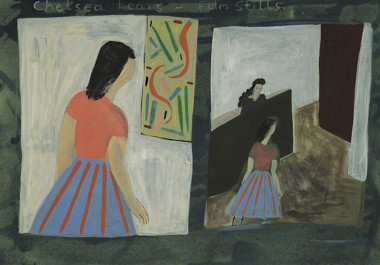You’d be forgiven for knowing Caroline Kennedy-McCracken as a musician rather than a painter. After hit singles with ’90s pop act Deadstar she went on to play in a string of Australian bands and these days performs solo as Caroline No! and collaborates with bands like the Dirty Three.
Alongside her music career, Kennedy-McCracken has developed a robust visual arts practice. Having painted for more than a decade, her work shifts between studies in colourful floating abstraction and humanistic, expressive figures. Shortlisted for the Siemens-RMIT Fine Art Awards in 2009, she is now working on a PhD that combines her background in visual arts and music to explore art’s place in a capitalist context.
Kennedy-McCracken sees songwriting and painting as almost one and the same. There is a lyricism and sense of motion in her work, propelling forward much like the trail of a song. She explains that in her mind songs and paintings employ the same strategies – they are gestural and immediate, communicating through well-known conventions.
Kennedy-McCracken rarely exhibits her work, preferring to paint for pleasure and give her work to friends. She says that she sees her ‘paintings as like letters’: humble, simple messages to be sent out into the world. Chapter House Lane’s March exhibition will provide a rare opportunity for Melbournians to encounter the work of this multi-talented artist.
In the perfect fusion of music and visual arts, our opening event will feature live performances from members of the band Caroline No!, Mladen Milinković, Esther Edquist and Ian Wadley.
Caroline Kennedy-McCracken is a Melbourne-born artist with a diverse practice in painting, drawing, installation, sculpture, and music. An expressive colourist, her work exploits shifting signs, and references various art-historical contexts, from early modernism to medieval illustration, minimalism and expressionism. Her paintings reveal intimate narratives or utopic glimpses, which dissolve into lyrical abstractions. Kennedy-McCracken’s practice is structured around the understanding that individual experience is contingent upon frames of reference that are mutable. Each work in her practice relates to other works, forming an expanding proposition about the psychological, intuitive, sensory and individual. For more information, see her website.

